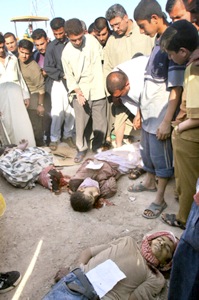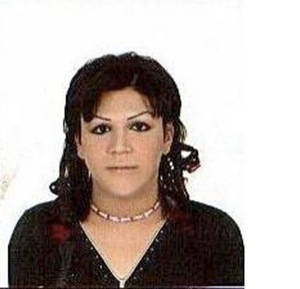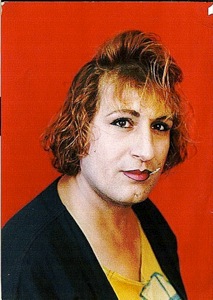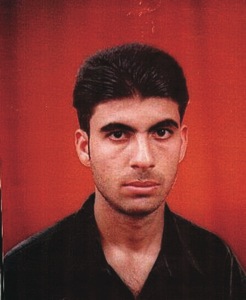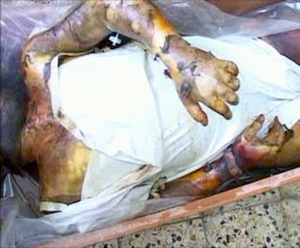-
- Connecticut’s civil unions law heads to court in a battle with implications for entire United States
- Television evangelist Falwell dies at 73
- Connecticut lawmakers pull same-sex marriage bill days before high court case
- Presidential hopeful Brownback addresses state GOP convention
- Idaho school’s ‘unisex’ restroom sparks debate
- National News Briefs
- World News Briefs
feature
Democracy’s deaf ear
In its quest to bring democracy to the Middle East, U.S. government fails to prevent execution of gay Iraqis
Published Thursday, 17-May-2007 in issue 1012
During her final conversation with the Gay & Lesbian Times last week, Nancy Beck, a spokesperson with the U.S. State Department, offered the same icy mantra for each question posed:
“My answer to you, and all I have for you, is this is documented in our human rights report and I refer you to that. There is no one else [who can help you].”
“What does the State Department plan to do about the systematic torture and execution of gay and lesbian Iraqis at the hands of Islamic fundamentalists?” we wanted to know. “Who is looking into the matter?” “What, if anything, can be done to stop the killing?”
“I have done the legwork for you,” Beck repeated. “I’ve also checked on your behalf with the Near East and Asia Bureau [sic], and I refer you to our human rights report.”
Released in March, the State Department’s 14,800-word report on human rights practices in Iraq for 2006 reserved a paltry 142 words for what is being considered the “sexual cleansing” of the country. There was no mention of young men such as Wissam and Wathiq, whose stories are all but forgotten amidst the chaos of Iraq’s raging civil war.
A member of Iraq’s Olympic tennis team, Wissam Auda dreamed of competing in the tennis championships at Wimbledon. Driving through the al-Saidiya neighborhood of Baghdad a year ago this week, the vehicle he was traveling in was ambushed by an Islamic militia. Auda, along with his coach and a teammate, were pulled from the vehicle and murdered in the street. Though his killers claimed his crime was wearing shorts, Auda had received death threats from Muslim extremists for being gay.
A few months earlier, Wathiq, an openly gay architect, was kidnapped in Baghdad. Shortly after his abduction, his parents received a call from the Badr militia condemning their son’s homosexuality and demanding nearly $28,000 for his release. Though they paid the ransom, their 29-year-old son’s body was found days later in the street, mutilated and beheaded.
Since the start of the U.S. and British-led war, citizens believed to be gay, lesbian, bisexual or transgender have been dragged from their homes by hooded militias and either shot, set on fire or beheaded – regardless of sect. According to London-based human rights organization Iraqi LGBT, members of Prime Minister Nouri al-Maliki’s government are linked to the anti-gay death squads. The two militias believed to be behind most of the killings are factions of the fledgling Iraqi government backed by President Bush and outgoing British Prime Minister Tony Blair, the Madhi army – a militia of Muqtada al-Sadr, and Badr brigades – a militia of the Supreme Council for Islamic Revolution in Iraq.
In an earlier conversation with the Gay & Lesbian Times, Beck said she was unaware of the minimum 85 GLBT Iraqis targeted for execution since the start of the U.S.-led war, though she promised to look into the matter. She also referred the inquiry to Elyse Bauer, with the State Department’s Bureau of Democracy, Human Rights and Labor, who failed to return repeated voicemail messages about the issue.
Mention of the violence against GLBT Iraqis in the State Department report fell under a section titled, “Other Societal Abuses and Discrimination,” tucked just paragraphs from the end. Reports of similar lengths detailing human rights abuses in Iran and Saudi Arabia issued by the State Department reserved only 278 words for anti-gay activities in Iran and 346 words for anti-gay abuses in Saudi Arabia.
According to multiple news reports, large portions of Iraq are currently under the control of death squads and militias, which target people for what they view as “crimes against Islam.” Punishable offenses have included wearing shorts or jeans, consuming alcohol, agreeing to shave a man’s beard, dancing, listening to Western pop music, eating or serving a “sexually immoral salad,” and, for women, going out in public unveiled.
Though the United Nations and British government officials have acknowledged the violence against GLBT Iraqis, activists say little if any pressure has been placed on the Iraqi government to call off the Islamist death squads.
“The British and Americans are an army of occupation; they are not really concerned about the interest or welfare of Iraqi people, gay or straight,” said activist Peter Tatchell, co-founder of British human rights organization OutRage UK. “They can’t even get the water, electricity and phone supplies working in large parts of the country, let alone act as human rights defenders for marginal groups.
“We’ve heard of many cases where Iraqi LGBTs have gone to the British and American authorities and appealed for protection,” Tatchell said. “In every case that has been brought to our attention, the U.S. and U.K. authorities have refused to help.”
Contacted by the Gay & Lesbian Times during the past month, several U.S. Congress members failed to respond to repeated requests for comment on the situation, including Republicans Duncan Hunter, a member of the U.S. Armed Services Committee, and Tom Lantos, Chair of the House Committee on Foreign Affairs. Democrats who failed to respond by deadline included Henry Waxman, Maxine Waters, Bob Filner, Loretta Sanchez and Sheila Jackson Lee.
San Diego Congressmember Susan Davis offered a three-paragraph statement, acknowledging the anti-gay violence buried within a sectarian war.
“We must use our limited time left in Iraq to not only reduce ethnic and religious violence before withdrawing our forces, but also ensure that we leave behind the beginning of a tradition amongst Iraqis that is respectful of all segments of society,” the statement read, in part.
Drew Hammill, deputy press secretary for House Speaker Nancy Pelosi, would not confirm on the record whether or not his boss was aware of the situation, stating that she was too busy to be briefed about the Gay & Lesbian Times’ request. Hammill issued the following statement on her behalf: “The Speaker opposes discrimination anywhere in any form and hopes that the political leaders of Iraq will work for the creation of a tolerant society.”
After follow-up phone conversations to stress the gravity of the situation – which many would say is genocide rather than mere discrimination – Hammill twice revised and extended his statement, settling on the following: “The Speaker is deeply concerned with the reported human rights atrocities in Iraq against gays and lesbians. She recognizes that little can be done to address the serious human rights issues that exist in Iraq until security, and law and order are brought to the country.”
Only openly gay Congressmember Barney Frank offered to take action.
Though in an initial phone message Frank said he wasn’t aware of the situation, he phoned the Gay & Lesbian Times the following day to say he had reviewed information forwarded to his office and would be drafting letters.
“We’re going to do a letter to the secretaries of state and defense telling them that this is a distressing situation and that they should be putting pressure on the Iraqi government to try and change it,” Frank said. “I think I’ll be able to get some other members to sign.”
Though Frank said he is “not optimistic” about ending the violence outright, he said he believes the U.S. government has the power to illicit change.
“I mean, we can’t get the Iraqis to do everything we want, which is crazy, but I think U.S. pressure, if it was applied right, could at least alleviate the problem,” Frank said.
Al-Sistani’s chilling mandate
Serving as the death squad’s chief ringleader is Iraq’s leading Muslim cleric, British and U.S.-backed Grand Ayatollah al-Sistani. In October 2005, al-Sistani issued a “fatwa,” or Islamic religious decree, calling for gays and lesbians to be murdered “in the worst way possible.” It wasn’t until after the U.S.-led invasion in 2003 that al-Sistani, Iranian, relocated to Najaf, Shiite Islam’s holiest city.
According to OutRage, last year a death squad stormed the home of two lesbians in the city of Najaf, shot them to death, slashed their throats and murdered a young child the couple had rescued from the sex trade. By sheer luck, several gay men seeking refuge in their home were not there at the time of the attack.
San Diego author Jeff Archer has been monitoring the situation in Iraq since the late ’70s, around the time of former President Saddam Hussein’s ascent to power. Archer’s forthcoming book, The Mother of All Battles: the Endless U.S.-Iraq War, includes a chapter titled, “Women and Gays Don’t Count,” recognizing the anti-female and anti-gay violence that has erupted since Hussein’s fall from power.
“Shortly after [al-Sistani’s] statement, Bush called him a man of great courage and integrity,” Archer said. “Bush must know what’s going on over there. Every one of our politicians must know. Not one has stood up and said anything about it. Amnesty International, at the end of 2006, said they’d never heard of this.”
Iraqi LGBT: a lone warrior for the voiceless
Serving as a solitary lifeline to GLBT Iraqis afraid or unable to flee the country is Ali Hili and his London-based human rights organization, Iraqi LGBT.
With assistance from OutRage and a number of covert gay and straight allies inside Iraq, Hili has established a series of safe houses for GLBT Iraqis in major cities such as Baghdad, Najaf, Karbala, Hilla and Basra. Each houses between 10 to 12 people, Hili said.
In December, Hili was on the phone with five members of his organization when their meeting in a poor Shi’a section of Baghdad was raided and they were taken away at gunpoint by Iraqi police. One of the men’s mutilated bodies was later discovered; the others are still missing. The incident was the only one specifically referenced in the U.S. State Department’s human rights report.
“It’s very dangerous and we might face, at any minute, a raid, closure and execution for every member of these houses,” Hili said. “I know it could happen, but it’s at least something to do, rather than just sitting there and waiting [for people to be killed].”
Expenses for each safe house are from $800 to $1,000 per month, which covers rent, security, food, gas and cell phone cards, which must be changed periodically to avoid having phone calls traced.
“It’s so expensive, and we’re running out of funds,” Hili said. “We are under danger of closing two houses this month if we don’t get any donations. It’s a major issue for the group.”
Meanwhile, attacks against GLBT Iraqis are becoming more frequent.
“It’s getting worse and worse every day,” Hili said. “In most cases, when they throw bodies on the street and nobody identifies them, the government takes the unknown bodies and buries them in unknown sites. There are hundreds and thousands of people who don’t know where to go to get their family victims’ bodies.
“We keep hearing every day about someone being killed, two or three, and that’s just [through] our circle of friends,” Hili said. “I’m sure there are others….We have few correspondents and they only cover five cities.”
Life under Saddam
Hili, who fled Iraq in 2000, and is currently seeking asylum in the U.K., has ample reason to despise Saddam Hussein. At the age of 18, he became one of a number of gay Iraqis recruited by Hussein’s regime to use his sexual orientation and masculine charms to spy for the Iraqi intelligence agency. At 33, Hili still carries a decade of physical and emotional scars to show for it. When the government felt he wasn’t extracting adequate or accurate information from the gay and bisexual men he was recruited to befriend, he was rounded up and tortured, often in a sadistic sexual nature. Due to the shattered infrastructure and U.N. sanctions following Operation Desert Storm, Hili was unable to receive proper medical treatment. Today, he is unable to urinate without the use of hot compresses, due to damage to his urethral muscles. Excessive scar tissue prevents ordinary bowel functions.
Despite his abuse, Hili is among a large number of gay and straight Iraqis who say conditions for GLBT people in Iraq are far worse today than under Hussein’s rule.
“Don’t get me wrong, Saddam is bad, but every dictator has his own way to rule, and he’s not so different from Saudi’s kings or Kuwaiti’s princes,” said Hili, who had a personal fatwa issued against him from al-Sistani’s organization.
Though forced into the uncompensated employment of the Iraqi government, outside his secret life, Hili was relatively open about his sexual orientation.
“I was very successful in a society where, if you speak good English and if you know a lot about pop music, movies and that kind of culture, people looked at you like you were out of this world,” Hili recalled. “I’d been very successful in having a group of heterosexual friends and gay friends who respected me and accepted me. We didn’t talk about homosexuality; people knew we were that way and we lived our lives.”
Two men holding hands in public or dining together in a restaurant wouldn’t have attracted much attention, Hili said.
“We used to have sex on the Tigris River,” Hili recalled. “We’d drink together, a group of guys, everyone with his boyfriends…. I know gay men that were caught having anal sex by a police [officer] and they just let them go.
“At that time, there were the sanctions and the economic crisis in Iraq,” Hili said. “There was so much more to worry about [than] homosexuals.”
Scott Long, director of the LGBT Rights Program for Human Rights Watch, said his organization has been posting warnings on Web sites with chat rooms for gay Iraqis.
“We didn’t speak to anybody who had encountered severe violence, but some people had been threatened over the Internet, within Iraq,” Long said.
Though his group pulled its correspondent out of Iraq a year ago to protect her safety, Long questions people pining for the halcyon days of Hussein and questions how much weight al-Sistani’s fatwa really carried.
“I would hardly say that gay people were safe under Saddam,” Long said. “It was a surveillance society. Anything that could be used to blackmail people or intimidate them was used. There are at least reports that in 2001 or 2002 a decree of the Revolutionary Council made homosexual conduct punishable by death. That was reported by Amnesty [International].”
However, Long conceded: “It’s possible that it may have been misread by Amnesty, that it only referred to, for instance, homosexual prostitution. There was definitely a morals crackdown going on in the last years of Saddam’s regime, but to the degree in which it affected ordinary LGBT people, I just don’t know.”
Ibrahim Ebeid, co-editor of the blog al-maharer.net, lived in Iraq for four years during the 1970s, working with the Ba’ath Party and the Palestine Liberation Organization. He returned frequently thereafter to visit friends.
Under Hussein’s reign, Ebeid said, the country was progressive and prosperous, and homosexuality was not an issue.
“I had lots of gay friends there and acquaintances and they had normal jobs,” Ebeid recalled. “Some of them were in the Ba’ath Party, some in the Communist Party. The government there was secular…. I never heard of any gay arrested or of any who was killed. The killing started after the invasion of Iraq. It’s really very sad now. If you hate someone, you just have to say, ‘He is gay,’ [whether] he is or not. They go in front of his family and they shoot them there right on the spot.
“I came from a Christian background, but, living there, I understand Islam very well. This is against the principals of Islam itself.”
One gay man living in Iraq Archer interviewed for his book said he is afraid to leave his house.
“I don’t want to be gay anymore,” he told Archer. “When I go out to buy bread, I’m afraid. When the doorbell rings, I think they’ve come for me.”
A secular society
Faisal Alam, a gay Pakistani American and founder of Al-Fatiha, an organization working to further the cause of GLBT Muslims, characterized Hussein’s government as “secular and socialist in nature.”
“While his regime was atrocious in human rights violations [regarding] Iraq’s Kurdish community and the majority of the Shi’a population, the country did have a stable government that provided for the basic needs of all its citizens,” Alam said. “Prior to the embargo placed on Iraq in 1992, Iraq had universal health care for all its citizens. It was also one of the most liberal and educated countries in the entire Middle East. Women had freedom, and all Iraqi citizens were guaranteed a higher education.
“With the invasion of Iraq, mass chaos has ensued…. These old [sectarian] divisions are now causing people to turn on one another…. The U.S. government is not interested in helping LGBT people. In fact, these militias are often targeting LGBT people with the knowledge of U.S. troops.”
Christian Iraqis once hailed Hussein for defending their freedom of religion, Hili added.
“I even hear that a lot now from Christian friends in London,” Hili said. “They say: ‘He really protected us and our church. Nowadays, we have no place.’”
Guilty until proven innocent
Fearing for their lives, some of Hili’s gay friends in Iraq have sought refuge inside heterosexual marriages.
“One man was kidnapped three times for just having relationships with men 10 years ago,” Hili said. “They kept asking him about his history and he said: ‘I repressed all of that. I’m not practicing. I’m just having sex with my wife.’ He has to prove that he will never get close to a man…. They said that they would be monitoring him.”
U.N. support denounced by Iraqi government
In January, the United Nations Assistance Mission to Iraq acknowledged media accounts of the GLBT persecution in Iraq.
“Armed Islamic groups and militias have been known to be particularly hostile towards homosexuals, frequently and openly engaging in violent campaigns against them,” the report stated. “[We were] also alerted to the existence of religious courts, supervised by clerics, where homosexuals allegedly would be ‘tried,’ ‘sentenced’ to death and then executed.”
The report prompted the following swift and hostile response from an Iraqi government spokesperson: “There was information in the report that we cannot accept here in Iraq. The report, for example, spoke about the phenomenon of homosexuality and giving them their rights. Such statements are not suitable to the Iraqi society. This is rejected. They [the U.N.] should respect the values and traditions here in Iraq.”
Cultural differences
In an interview with National Public Radio host Terri Gross, Brian Whitaker, author and editor of British newspaper The Guardian, touched on the history of homoeroticism in the Middle East that seems to belie the anti-gay attitudes of today’s Islamic fundamentalists.
“The idea of male beauty or male attractiveness is something which has been very widely accepted over a long period,” Whitaker said. “You can even find it in the Quranic vision of paradise where, apart from the virgins, there are rather attractive young men serving people their drinks.”
Early European travelers in the 17th through 19th centuries documented their accounts of homosexuality in the Middle East, the tacit acceptance of which was largely unfamiliar to them.
“Quite a lot of them described the sexual behavior there in quite extraordinary terms,” Whitaker said. “Very curiously, the sort of image that is promoted in the Middle East now about homosexuality being part of Western decadence, in the 18th and 19th century was described in Europe as a sort of oriental way of behavior.”
Open displays of affection between heterosexual men have long been part of Iraqi culture, Hili noted.
“In our tradition and in our culture, men used to walk hand-in-hand, kiss on the cheek, and that’s even for heterosexuals,” he said. “Now we have a society where heterosexuals [are afraid] to hold hands. People didn’t know before the difference between holding hands between friends and … holding hands as a symbol of homosexuality.”
Hili recalled an incident in which a colleague claimed a U.S. soldier used an anti-gay slur to degrade two heterosexual Iraqi’s walking hand-in-hand.
“These guys started to think: ‘Oh my God, there’s something wrong in the way we act.’ I said: ‘No, no, no. This is how you are. You’re not homosexuals.’”
The incident illustrates the larger atmosphere of ignorance that he sees as rampant among Iraq’s occupying forces.
“They should have been more understanding, studying our culture before we were invaded,” Hili said.
No safe passage
Though Hili initially set out to help gays and lesbians make it out of Iraq and into neighboring countries such as Syria and Lebanon, the increasing violence in the country has made travel next to impossible, he said.
“We’ve become a burden on neighboring countries – a heavy burden because of massive refugees and excess movement from Iraq to neighboring countries,” Hili said. “Turkey’s impossible. They don’t issue visas to any Iraqis anymore. They haven’t for years.”
An end to the killing
After consulting colleagues at Amnesty International and with human rights groups in the U.K., Scott Long at Human Rights Watch considers the persecution of GLBT Iraqis an “impossible situation.”
“I think Ali is doing everything he can, both to provide some measure of safety and to document the situation, but it’s a country that’s in a state of total collapse, and until that collapse is halted, I don’t think there’s going to be any safety for LGBT people.”
Removing the militias from the police force and the Ministry of the Interior has been a stated U.S. policy goal for two years, to no avail, Long noted.
“I don’t think we have the political clout in Iraq to achieve that right now, Long said. “The only thing that’s going to improve the situation for LGBT people is an end to the violence overall and a restoration of some kind of rule of law.”
Tatchell believes the problem could be solved, in part, by getting GLBT Iraqis out of the country.
“The United Nations Assistance Mission in Iraq, together with the Red Cross and Red Crescent, could and should be running safe houses for women and LGBTs who are fleeing Islamic death squads,” Tatchell said. “They ought to be providing travel documents so that these victims can escape to neighboring countries like Syria, Jordan and Turkey. The United Nations High Commissioner for Refugees is failing in its duties.”
However, for those who make it out of Iraq, their problems do not end. After Hili fled the country in 2000, he found himself near starvation on the streets of Amsterdam.
“I have people in the Ukraine. I have people in Romania – stuck in countries where there’s no one helping them,” he said. “They have fled violence and they are desperately [in need of] help. I just spoke to a couple over the Internet. They are losing hope. They want to go back to Iraq, and I keep telling them: ‘Hold on to where you are. You should never give up.’ But what can they do? They have no money. Governments are refusing them. I’m sure there are hundreds of thousands who are stuck in countries where nobody cares about what they have been through.”
For more information about Iraqi LGBT, visit http://iraqilgbtuk.blogspot.com.
Ali and Spencer: overcoming impossible odds
Through Ali Hili’s escape from coerced employment with the Iraqi intelligence service to his current activism on behalf of GLBT Iraqis, his partner of seven years, Spencer Lockhart, has been by his side.
At first glance, Lockhart, a Texas Republican, would seem an unlikely sympathizer. A successful international businessman, Lockhart had been in the United Arab Emirates recruiting nurses to come work in the United States.
Hili and Lockhart met in September 2000 at Jules, a nightclub in Dubai, the port city of the United Arab Emirates. As a flirtation ensued and the conversation progressed, Hili began to pour his heart out, recounting to an incredulous Lockhart his recruitment by the Iraqi government and his subsequent after-school training in the use of guns, silencers, poisons, chemical weapons and methods of document destruction.
“I’m like a typical American,” Lockhart told the Gay & Lesbian Times. “I’m thinking, ‘This is like a bad novel or movie.’”
Yet, as the story unfolded, Lockhart grew to trust what he heard.
Through his company, Lockhart was able to relocate to London in 2000, while Hili was in Amsterdam trying to obtain a visa for passage to England.
During this time, Lockhart depleted his personal savings trying to help Hili, and has yet to fully recover them. Legal fees in Hili’s asylum case range from $300 to $500 per hour. Lockhart estimates that he has spent around $40,000 so far.
Beyond the financial burden, the couple still deals with the emotional and physical scars caused by Hili’s torture.
“In my mind, I thought in three or four years all of this will be over with, but it’s going on seven years now and it’s not over with,” Lockhart said, a well of emotion rising in his voice. “But, when you love somebody, that’s what you do.
“He has so many issues around his torture and he’s got a lot of damage that we’re trying to deal with medically right now. Yeah, it does make it hard sometimes on the relationship, but when I accepted this responsibility, and he did too, we knew it wasn’t going to be easy.”
In response to death threats the couple has received, London’s metropolitan police afford them a modicum of security.
Like many Americans, Lockhart said, he initially supported the war in Iraq.
“I was hoping that they would take out Saddam because he was a horrible person, but I don’t think in my wildest imagination that I ever thought anything like this would ever happen to any of the people of Iraq, gay or straight.”
Given an audience with the U.S. government, Lockhart said he would advise, “Get out of your bubble.”
“I just don’t think we can go around changing the world to our standards,” Lockhart said. “When did it become America’s job to become the world’s policeman? … Saddam suppressed the Shi’a population for 20 years. Somebody should have thought that they were bound to rise up after being suppressed all these years.
“As far as the lesbian and gay population goes, they need to wake up at home as well,” Lockhart said. “We’ve had violence against gays in America and we’ve come to think that that’s sort of in the past. I think if somebody pulled somebody out and started killing people and shooting them in the street, all of the sudden it would be a different story in America.”
[To protect the safety of surviving family members, some of the people mentioned in this story are referred to by first name only or by pseudonyms.]
|
|
Copyright © 2003-2025 Uptown Publications


